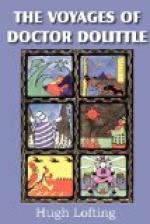But this the Indians would not permit on any account. They had been used to having their kings rule in a truly grand and kingly manner; and they insisted that he have built for himself the most magnificent palace ever seen. In all else they let him have his own way absolutely; but they wouldn’t allow him to wriggle out of any of the ceremony or show that goes with being a king. A thousand servants he had to keep in his palace, night and day, to wait on him. The Royal Canoe had to be kept up—a gorgeous, polished mahogany boat, seventy feet long, inlaid with mother-o’-pearl and paddled by the hundred strongest men in the island. The palace-gardens covered a square mile and employed a hundred and sixty gardeners.
Even in his dress the poor man was compelled always to be grand and elegant and uncomfortable. The beloved and battered high hat was put away in a closet and only looked at secretly. State robes had to be worn on all occasions. And when the Doctor did once in a while manage to sneak off for a short, natural-history expedition he never dared to wear his old clothes, but had to chase his butterflies with a crown upon his head and a scarlet cloak flying behind him in the wind.
There was no end to the kinds of duties the Doctor had to perform and the questions he had to decide upon—everything, from settling disputes about lands and boundaries, to making peace between husband and wife who had been throwing shoes at one another. In the east wing of the Royal Palace was the Hall of Justice. And here King Jong sat every morning from nine to eleven passing judgment on all cases that were brought before him.
Then in the afternoon he taught school. The sort of things he taught were not always those you find in ordinary schools. Grown-ups as well as children came to learn. You see, these Indians were ignorant of many of the things that quite small white children know—though it is also true that they knew a lot that white grown-ups never dreamed of.
Bumpo and I helped with the teaching as far as we could— simple arithmetic, and easy things like that. But the classes in astronomy, farming science, the proper care of babies, with a host of other subjects, the Doctor had to teach himself. The Indians were tremendously keen about the schooling and they came in droves and crowds; so that even with the open-air classes (a school-house was impossible of course) the Doctor had to take them in relays and batches of five or six thousand at a time and used a big megaphone or trumpet to make himself heard.
The rest of his day was more than filled with road-making, building water-mills, attending the sick and a million other things.
In spite of his being so unwilling to become a king, John Dolittle made a very good one—once he got started. He may not have been as dignified as many kings in history who were always running off to war and getting themselves into romantic situations; but since I have grown up and seen something of foreign lands and governments I have often thought that Popsipetel under the reign of Jong Thinkalot was perhaps the best ruled state in the history of the world.




